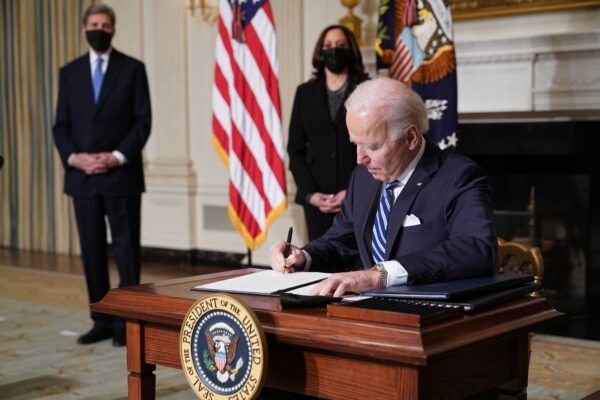It is standard procedure for committees at the start of a new Congressional session to outline their goals for the next two years, especially when a chamber is under new management.
With Republicans assuming control of the United States House of Representatives following November’s midterm elections, the newly installed GOP leadership has been doing just that across the chamber’s 20 standing [permanent] committees and their 104 subcommittees and select [temporary] panels.
That transitional shift-change has been clearly evident this week in seminal session meetings of the 52-member House Energy & Commerce Committee and its six subcommittees and in the 45-member House Natural Resources Committee and its five subsidiary panels.
During four years of Democratic control, climate change, environmental protection, and “green” energy development were among primary policy drivers in adopting legislation designed to coax the nation away from reliance on oil and gas, including the $1.2 trillion Bipartisan Infrastructure Law (BIL) and $740 billion Infrastructure Reduction Act (IRA).
During two days of nearly eight hours of hearings before the House Energy & Commerce Committee on Feb. 7, and before the full House Natural Resource Committee on Feb. 8, Republicans made it clear that many initiatives passed under the Biden administration promoting electric vehicles, carbon capture, green energy, and environmental protection are on the proverbial block.

Energy Panel Plots New Course
During the near-six hour House Energy & Commerce Committee meeting, six witnesses testified on a raft of 17 Republican-sponsored bills that proponents argue are key to “restoring American energy dominance.”
Among the proposed measures that will dominate the committee’s and its subsidiary panels’ agendas in the coming months are bills prohibiting restrictions on hydraulic fracking without Congressional approval; expanding natural gas exports; repealing the IRA’s Green House Reduction Fund; and amending the Clean Air, Toxic Substances Control, Solid Waste Disposal, and National Gas Tax acts.
Within the tranche of proposed legislation on the committee’s “unleashing American energy agenda,” are bills calling for permitting reform, promoting development of “critical minerals,” and prohibiting the import of Russian uranium.
In kicking off the day-long hearing, Republicans argued that “unleashing American energy, lowering energy costs, and strengthening supply chains” must be a priority if the United States is to be economically competitive in the 21st century and beyond.
“America has been blessed with an abundance of natural resources. We should be working towards developing a predictable regulatory landscape across-the-board that inspires innovation, entrepreneurship, and technological leadership, hydropower, nuclear, fossil energies, wind, solar, and batteries,” House Energy & Commerce Committee Chair Rep. Cathy Rodgers (R-Wash.) said in opening the proceedings.
The nation needs an “all-of-the-above” energy strategy, she and others insisted, claiming the Biden administration’s pro-green agenda is promoting technologies that either aren’t feasible or don’t have the domestic raw materials and processing capacity to now sustain.
Case in point, they note, is the promotion of electric vehicles (EVs) when more than 80 percent of the lithium needed to power EV batteries, and the capacity to manufacture them, are in China.
“Rush-to-green energy policies—both state and federal—have curtailed reliable energy and infrastructure, resulting in everything from blackouts to spiking prices,” Rodgers said. “These policies are unsustainable and lead to greater reliance on countries like Russia, or in our case, China. This is not a future any of us want.”

Democrats, outnumbered 29-23 on the panel, said panel Republicans were working on behalf of industry interests instead of the American people.
“We need our energy policy to have vision and that vision should not be solely about how to further enrich oil and gas companies, which are already raking in record profits,” Rep. Paul Tonko (D-N.Y.) said, noting he “strongly supports” reviewing and upgrading the nation’s energy strategies “but, unfortunately, nearly all the bills before us today continue to look backwards.”
Tonko and Rep. Frank Pallone (D-N.J.), among others, said a proposed bill calling for the elimination of the Methane Emissions Reduction Program would be short-sighted.
That program provides industry “with significant funding to adopt emissions-reducing technologies with a market-based, incentivized approach,” Pallone said. “This is a sensible program that provides certainty for industry while incentivizing the reduction of super pollutants from the oil and gas sector.”
Several other bills “would create new loopholes in important environmental laws” which Republicans are trying to fast-track “with little concerns for Americans’ air, water, safety,” he said.
“Committee Republicans are showing today that their top energy and environmental priorities … are to do the bidding of ‘Big Oil’ and to undermine our nation’s bedrock environmental laws,” Pallone said, saying the GOP is “stuck in the past, and failing to address the energy challenges and opportunities we face today.”

Natural Resources Refines Mission
The House Natural Resources Committee, with a 25-20 GOP majority, continued on the same theme Feb. 8 that the Energy & Commerce Committee established the day before.
Although there wasn’t any legislation on its agenda, the panel adopted its ‘Authorization and Oversight Plan,’ essentially a mission statement, in a 21-16 partisan vote.
“House Republicans made a lot of promises last year and now the American people have given us the majority and we are ready to deliver on those promises,” Chair Rep. Bruce Westerman (R-Ark.) said. “It was clear that energy independence, energy security, and lowering consumer costs was a top priority for our country and, therefore, for this committee.”
The 12-page plan calls for enhanced budget and spending reviews of federal land management programs and agencies under the committee’s jurisdiction’; expanding domestic energy production; expanding oil and natural gas programs, including offshore; investing in renewable and alternative energy; advancing “mineral security; and reducing coal mining regulations, among other initiatives.
Westerman said despite the push for alternate energies—and President Joe Biden’s State of the Union comment about oil and gas only needed for 10 more years—80-to-85 percent of U.S. energy use comes from oil and gas.
“Given this dependence,” he said, any administration, regardless of party affiliation, should be working “to unlock American potential to produce these necessities of life. Instead, we’ve seen an attack on the production of American oil and gas, on mining, which translates into an attack on the economy of America.”
Imposing stifling regulations on U.S. producers “doesn’t help the environment out one tidbit when we are importing these products from countries that do not have near the human rights standards, near the environmental standards, or can produce these materials as efficiently and effectively, as we can there at home,” Westerman said.

Current energy policies not only degrade the economy but imperil national security, he said. “We are exporting wealth from here in the United States, many times to our adversaries, because of a not-in-my-backyard mentality. We hope to change that mentality.”
Westerman said the “narrative out there that Republicans only care about the bottom line and don’t care about the environment … is false” and short-sighted.
“Republicans care about the environment and the economy” and believe when “we produce more products here at home, we benefit both greatly,” he said. “The problem with the Democrats, and this administration particularly, is two things: physics and math. They ignore the science to create the idea of utopia centered around electric vehicles. I have no problem with electric vehicles,” but right now, the nation does not have the domestic capacity to support a massive expansion of EVs without enriching China.
Rep. Raul Grijalva (D-Ariz.), the committee’s ranking member and recently unseated chair, said the plan gives climate change and its impacts short shrift.
“Climate change is only mentioned twice” in the plan, he said. “Yet the single most-pressing issue affecting every single one of us every single day is climate change. My colleagues on the other side of the aisle still think it can be ignored, avoided, and, in some instances, outright denied.”
Grijalva said the panel’s Democrats will insist “that climate must be a central focus of any legislation” and called for Republicans to support that emphasis, although he acknowledged that was unlikely.
“There was a moment yesterday in the president’s State of the Union address—almost like an epiphany—where we reached common ground” in agreeing “Social Security and Medicaid was off the table. We’re all going to work together to make them stronger. I thought that was a rare and good moment, a special moment,” he said. “I hope we can look to find some common ground on some issues in this committee, but I don’t think today is one of them.”
Grijalva’s proposed amendment to incorporate a statement that the impacts of climate change be weighed in evaluating proposals was shot down in a 21-15 partisan tally.







